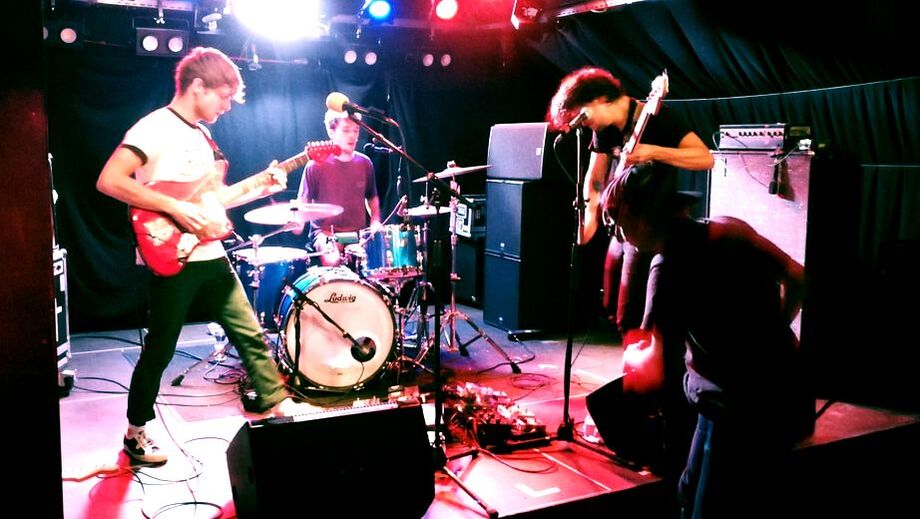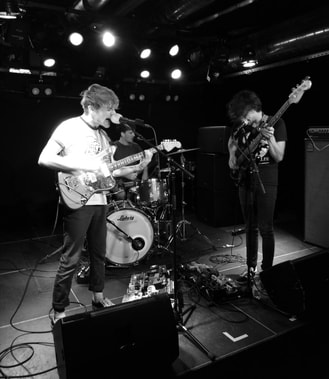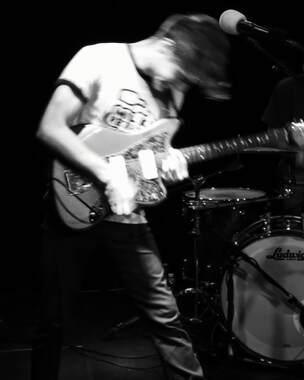Menu
|
My good friend Georgy Flouty was very excited. “You’ve got to listen to this,” he whatsapped me in August. “It’s the best album I’ve heard in the last five years, a French trio in their early twenties.” Georgy is not just anybody. He is a very talented musician who plays the guitar in a number of Lebanese bands, among them KOZO and Sandmoon. I immediately kicked off Spotify. “I like what I hear, very much so,” I replied to Georgy soon afterwards. “And you know what? They will play in Zurich on October 9. However there will be Deafhaven the same evening.” “They are insane live,” Georgy texted back (although he had never seen Lysistrata in concert, only some YouTube videos), “It reminds me of the first time I heard Spiderland (Slint’s legendary post-rock album). The same rush of heavy emotions.” And then: “Deafhaven can wait!” It’s October 9, I am in Zurich heading for Dynamo, a small club near the Limmat river. Lysistrata will perform here this evening, opening for Decibelles, a French band as well. Originally Lysistrata were scheduled to play at another venue, but the concert was canceled because of low pre-sales. Luckily Lysistrata were able to convince Decibelles to take them onboard for their gig. There is a lot of competition in town tonight. Lysistrata are a household name in France but even the best bands have troubles finding their audience if no one knows them, like in Zurich. In a few days, Lysistrata's second album “Breathe In/Out” will be released. Meeting the band proves simple. Ben (drums), Théo (guitar) and Max (bass) are very accessible and easygoing. We sit down on the edge of the stage and start talking. Max is holding my mobile phone like a microphone to better record his and his colleagues voices. “How did you approach writing and recording a follow-up album when your first album was so successful?,” I ask the band. “You can only disappoint.” Ben is the first to answer. “We didn’t ask ourselves too many questions. We had all these riffs and stuff so we kind of assembled them. Our first album was a bunch of songs we had played for a long time and we wanted to get them on a record. For the second album, we were getting tired of playing the same songs all the time. We needed to produce some new stuff.” “Artistically we are totally free,” Max adds. “There is no pressure from the label, they are just interested to hear the final result.” When reading about Lysistrata one can clearly see that journalists struggle to define the band’s musical style. What is it what they are doing? Something between noise-rock, emo, math-rock and post-hardcore are the stamps that most articles try to put on Lysistrata, each article copying a previous one. The band’s influences are quoted to range from Sonic Youth and Nirvana to Fugazi and At The Drive In, a band from El Paso, Texas. “We have tons of influences,” says the band. “We listen to a lot of bands from the 1990ies, but also more modern stuff. However nothing in particular.” In an attempt meant to be half serious but also to make a joke, Lysistrata call themselves “Post-Everything”. All we do is post, they say, everything has already been played and done before, in one way or another. “If you are indeed Post-Everything then you are in fact Pre-What?,” I want to know. “What can happen to Lysistrata in the future?” Ben has an idea: “Maybe Post-Everything is actually Pre-Nothing. Maybe even Pre-Everything and Nothing.” Despite their very young age - and perhaps precisely because of that - Lysistrata have a lot of self-confidence. They are certainly not bothered with finding a label and a drawer for their brand of music. It’s just their way of rock ’n’ roll. When I listened to Lysistrata to prepare for the interview I did it in the gym most of the time. Their energetic, in-your-face rock songs make you go faster on the treadmill and lift heavier weights. What is Georgy’s take on Lysistrata second album? Already back in August Georgy had his doubts. “Their new album comes out on October 18,” he said. “ I hope they can keep the bar up high (which is not doable in my opinion).” “What caught my attention in their debut album ‘The Thread’,” Georgy later told me, “is the balance that Lysistrata created between the different genres of music I grew up listening to. The album smoothly shifts from harsh noise to emo-like math-rock, with beautifully placed and timed chords and transitions that kept me on the edge of my seat. It’s chaotic and immature in the best of ways. As for the second album, I feel that they tried too hard to be more mature. It’s not as fun and flowy as their debut.” “We have transposed our setup from the rehearsal room onto the stage.” For my part I had much fun listening to Lysistrata’s second album and never got bored doing so. On stage Lysistrata are a powerhouse of their own. Too bad the concrete walls of the Dynamo club are a graveyard for any nuanced sound. The band’s energy is extremely engaging and their “singing à trois” makes them anything but choirboys. However what distinguishes Lysistrata from the rest of the rock pack are their long instrumental parts. Guitar, bass and drums are super tight and intertwined and at the end of a long dash to rock heaven and back, the difference between everything and nothing is all but blurred in my head. Lysistrata being so overwhelming on stage is also fueled by the way they set up the band when playing live. It is the same triangle formation that we know from FC Liverpool’s “trio infernal” of strikers Sadio Mané (let's say that's Max), Roberto Firmino (Ben) and Mohamed Salah (Théo). “On stage you are like locked in,” I ask the band. “What is going on inside the zone?” Ben again has the one-liner that explains it all. “We have transposed our setup from the rehearsal room onto the stage.” Théo and Max continue: “to truly play our music we need to look at each other often. It shows that we like a lot what we do. It has always been like that. We are like in a bulb. While conventional groups front the audience, we slightly turn to each other. Ultimately, the music happens between the musicians.” Lysistrata seem to be gone for a never ending world tour, playing gig after gig. Just last weekend they have been invited to the Blackwoodstock Festival in Nouvelle Calédonie (one of France’s overseas territories in the Pacific Ocean) and flew 30 hours to get there. They also have performed in Malaysia, Vietnam and China. Have they ever been threatened by a sex strike by their girlfriends because they spend too much time on the road? After all, Lysistrata is the historical figure that organized the sex strike in ancient Athens to stop the wars between Greece and Sparta. The band is laughing. “So far all is quiet on that front.” Lucky them, lucky us. The Lysistrata-show will go on. Very soon and very surely in a location near you.
1 Comment
|
EditorKurt is based in Bern and Beirut is his second home. Always looking for that special angle, he digs deep into people, their stories and creations, with a sweet spot for music. Archives
September 2020
Categories
All
I'd love to discover you. Share your creations here.
|




 RSS Feed
RSS Feed
